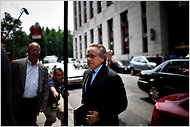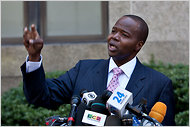Strauss-Kahn’s Lawyers Say He Won’t Plead Guilty
By WILLIAM K. RASHBAUM and JOHN ELIGON
After meeting with Manhattan prosecutors on Wednesday, lawyers for Dominique Strauss-Kahn characterized the session as “constructive,” but stressed that he was unwilling to plead guilty even to minor charges.
Ty Cacek/The New York Times
Benjamin Brafman, a lawyer for Dominique Strauss-Kahn, arriving at the Manhattan district attorney's office on Wednesday.
William W. Taylor III, who along with Benjamin Brafman is representing Mr. Strauss-Kahn, said late on Wednesday that they did not discuss a plea bargain in the sexual assault case against their client.
“Mr. Strauss-Kahn will not be pleading guilty to anything,” Mr. Taylor said.
In a sign of the deteriorating relationship between the Manhattan district attorney’s office and the woman who made the accusation, her lawyer sent a letter to the district attorney, Cyrus R. Vance Jr., requesting that he step aside and let a special prosecutor take over the case.
Mr. Vance promptly rejected the request. Prosecutors remove themselves only in extraordinary circumstances, generally when there is a personal stake in the outcome or a clear conflict of interest.
In the letter, the lawyer, Kenneth P. Thompson, said that Mr. Vance’s office had reached disturbing conclusions about his client based on a summary of a recorded phone conversation she had with a man in an immigration detention center.
Last week, prosecutors informed Mr. Thompson that the conversation raised “very troubling” questions about her credibility because she discussed the possible benefits of pursuing charges against a wealthy man.
But Mr. Thompson said on Wednesday that prosecutors had told him that they were basing their conclusions on “a digest of the conversation” rather than on the recording itself or a full transcript of it, which was in a dialect of the Fulani language of the woman’s native Guinea.
A law enforcement official, however, said on Wednesday that the recorded conversation between the woman and the man, who is accused of dealing drugs, was one of at least three in which she talked about the encounter with Mr. Strauss-Kahn and its aftermath. Investigators were continuing to review and analyze the conversations with Fulani interpreters, the official said.
In the letter, Mr. Thompson said that prosecutors had improperly maligned his client without access to the full conversation. He said they first described their understanding of the recorded conversation to him last Thursday, and then repeated it to The New York Times. Mr. Thompson cited The Times’s account of the conversation as one of several “damaging and prejudicial leaks” from prosecutors as part of the reason for requesting that Mr. Vance recuse himself.
The letter cited an e-mail that Mr. Thompson received on Tuesday from Mr. Vance’s chief assistant, Daniel R. Alonso, that read, “We at this point have only a digest of the conversation, so we need to have our interpreter prepare a complete transcript.”
Mr. Thompson said earlier this week that his client denied that she made the remarks that prosecutors have attributed to her. “She says it’s not true, that she didn’t say it,” Mr. Thompson said. “The way they’re describing the tape, she doesn’t agree with it.”
The law enforcement official said that after further translation and review, prosecutors were confident that the digest accurately reflected what she said.
The investigation has at points been hobbled by difficulties and delays in arranging for translators who were fluent in the dialect spoken by the woman, who accused Mr. Strauss-Kahn of sexually assaulting her when she went to clean his suite at the Sofitel New York on May 14.
Mr. Thompson, in an interview, said his client complained during one early interview session with prosecutors that the interpreter at that session was not rendering her words accurately. His client “stopped the guy, and says, ‘He’s not translating correctly, he’s not from my tribe,’ ” Mr. Thompson said. “Her tribe speaks a very unique dialect of Fulani.”
Erin M. Duggan, a spokeswoman for Mr. Vance’s office, said that the office had not received the letter from Mr. Thompson but that copies had been provided by reporters.
“We strongly disagree with how the office and the work of the assistant district attorneys have been characterized,” she said. “Any suggestion that this office should be recused is wholly without merit.”



